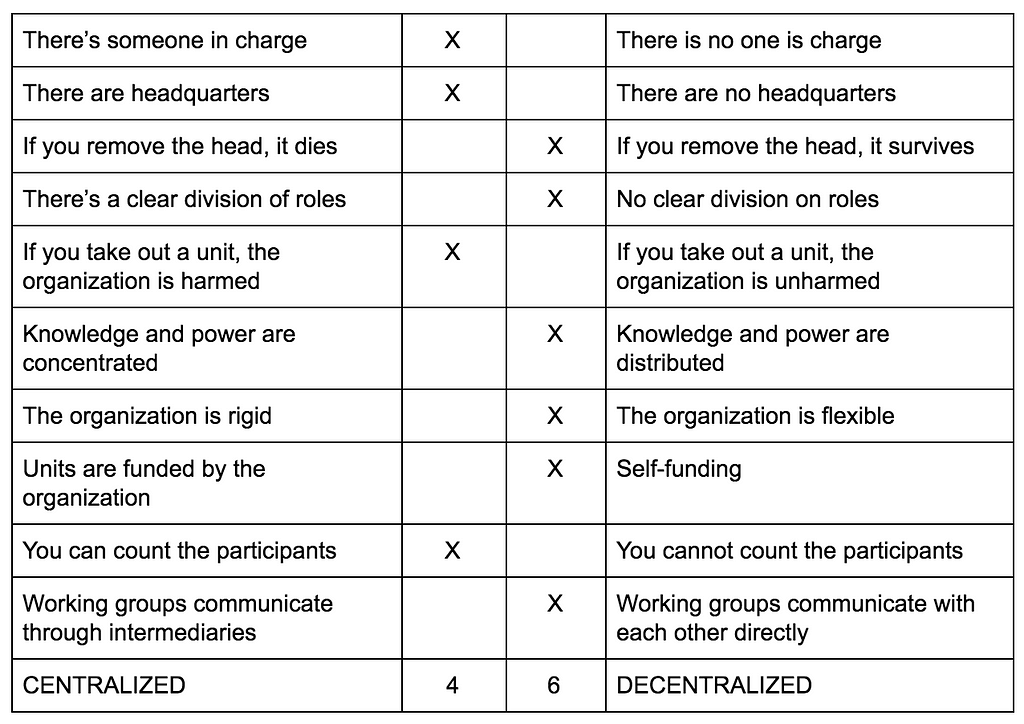Latest news about Bitcoin and all cryptocurrencies. Your daily crypto news habit.
 Credit: http://www.cowboysindians.com/Decentralization is the process by which planning and decision-making, are distributed or delegated away from a central, authoritative location or group.
Credit: http://www.cowboysindians.com/Decentralization is the process by which planning and decision-making, are distributed or delegated away from a central, authoritative location or group.
I, along with the rest of my team at HKEOS, believe that decentralization is the most important change that blockchain and cryptocurrencies will bring to the world. Decentralization has the potential to fundamentally change industries and states in a way that empowers individuals and better protects us from corporate exploitation and government corruption.
Principles of Decentralization
As a fan of “The Starfish and the Spider” by Ori Brafman, I will quote the 8 Principles of Decentralization with examples as stated in the book:
1.When attacked, a decentralized organization tends to become even more open and decentralized.
Incas and Apaches faced the same enemy, the spanish army. The centralized Inca Empire was defeated and collapsed, the decentralized Apaches survived and fought for decades. Surprisingly, the Apaches grew stronger and stronger at each Spanish attack.
2. It’s easy to mistake starfish (decentralized system) for spiders (centralized system).
At first sight, a native tribe in the Arizona desert gets easily underestimated and their power gets overlooked. The Spanish army was expecting to conquer them without any trouble.
3. An open system doesn’t have central intelligence; the intelligence is spread throughout the system.
Decentralized systems are not always more efficient, they are more reactive. The knowledge and the ability to use it is shared among the community.
4. Open systems can easily mutate
The Apaches weren’t expecting the Spanish army. Once under attack they reacted quickly, became nomads and changed their organisation accordingly.
5. The decentralized organization sneaks up on you.
A small group of people managed to change the whole music industry by creating peer to peer decentralized networks.
6. As industries become decentralized, overall profits decrease.
The revenue of the top four music industry corporations dropped by a 1/4 because of P2P networks. The 25% didn’t go to the founders of Emule or Napster, it just disappeared.
7. Put people into an open system and they’ll automatically want to contribute.
Wikipedia contributors provide accurate and coherent information. The peer review system makes this open system more objective and immune to censorship.
8. When attacked, centralized organizations tend to become even more centralized.
When facing adversity, centralized systems tend to respond with rules, processes and hierarchy. E.g. When countries fall into recession and financial crisis, the most common reaction is nationalism and closed borders.
What about EOS?
 Credit: https://eos.io/resources
Credit: https://eos.io/resources
Now that we’ve set the above principles for context, we can ask, how decentralized is EOS? Let’s note that the mainnet isn’t launched yet and that EOS will continue to evolve.
Since I’ve been working on EOS I’ve seen people struggling to differentiate the entities involved. This is important because each of them have different levels of decentralization, which in my opinion isn’t ideal (yet).
1. Block.one — The company developing the EOSIO software
 Credit: https://medium.com/block-one
Credit: https://medium.com/block-one
Block.one is a company with office locations in Blacksburg, VA and Hong Kong and known leaders like Brendan Blumer (CEO) and Dan Larimer (CTO). Being so, it’s clearly centralized and under risk if attacked in some way.
If a country or corporation decides to go after the the Block.one’s team for whatever reason, they have names and addresses to look for. I don’t think the whole project would burn to ashes but it makes the network vulnerable. This will be the case until the mainnet is launched june 2nd.
2. EOSIO (the software)
EOSIO is a free and open source software with clear promises. A scalable and bug free infrastructure for decentralized applications. In other words, EOSIO should work as an operating system for Dapps.
Also, the EOSIO software should ensure a “fair and transparent block producer (BP) election process utilizing a democratic delegated proof of stake (DPoS) consensus.” That leads us to our point 3.
3. EOS (the blockchain/protocol)
EOS as a blockchain/protocol, once launched on June 2nd, will in theory be truly decentralized. But, there are a couple aspects to keep in mind in order to guarantee it:
- Diversity of Block Producers
If most block producers are big entities from the same industry (e.g. Cryptocurrency exchanges) they could collude and move in the same direction to maximise their own interests, which would reflect a more centralized organization.
- Token Registration rate / Voting participation rate
If the percentage of Token registration remains very low until June 2 (around 20% today) it would mean that only the BP candidates will vote among themselves and vote trading could occur after the first results (even if against the constitution).
- Block Producers role
Block producers are vital to the EOS network and its success. BPs should be decentralized groups that run and govern the blockchain on behalf of the EOS token holders.
That’s why they should defend the community’s interests and not their own. In my opinion this will only happen through community education, rewards redistribution and user base growth.
Current state of decentralization
Here is my opinion on the current state of decentralization for EOS as a whole:
Conclusion
“Rome wasn’t built in a day.”
EOS has the potential to revolutionise the way we build, use and pay for products.
The current state of EOS as a truly decentralized organization is hard to analyse and probably not ideal but I hope and believe it will improve tremendously in the following weeks and months as we move from a conceptual project to a fully working network.
As a community we have the responsibility to spread the word and maximise token registration.
As a token holder you have the responsibility to register your tokens and vote because it will define your future as part of the community.
True decentralization will only be possible through a balanced and multicultural pool of Block Producers.
Let’s forget Lambo memes and build something meaningful.
I hope this will help the EOS community grow and thrive.Feel free to comment and correct me if I missed something.
- PM me on twitter or telegram (@hgkam) if you want to get in touch.
- Here’s my ETH address if you think this was helpful: 0x7658295a0A4BCa80013b9F809fA7dbcB3c64f788
- Stay up to date by following HKEOS on Twitter.
The state of decentralization in EOS was originally published in Hacker Noon on Medium, where people are continuing the conversation by highlighting and responding to this story.
Disclaimer
The views and opinions expressed in this article are solely those of the authors and do not reflect the views of Bitcoin Insider. Every investment and trading move involves risk - this is especially true for cryptocurrencies given their volatility. We strongly advise our readers to conduct their own research when making a decision.
